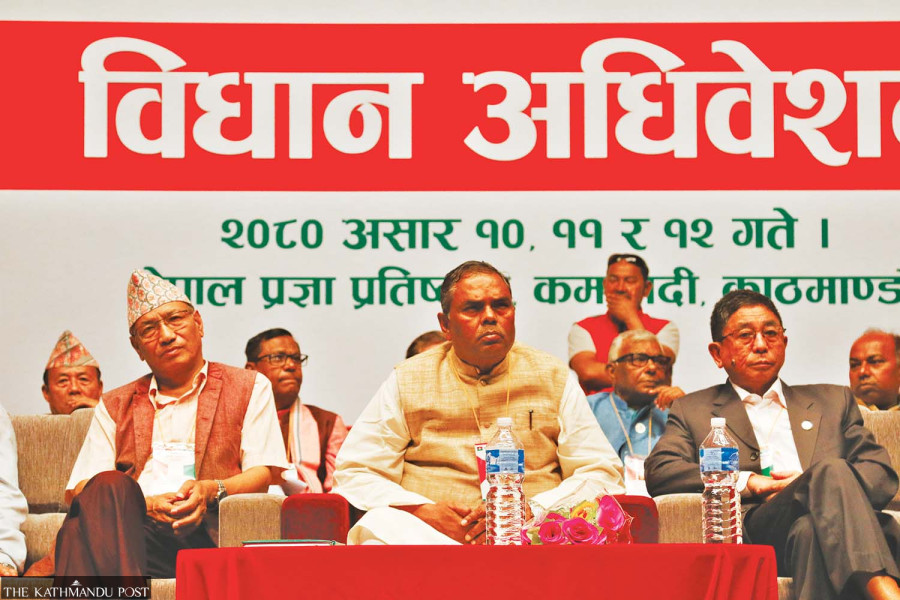Politics
JSP vows to lobby for directly elected president and fully proportional parliament
Party chair Yadav presented the draft of the statute on Sunday for deliberations among the party representatives attending the convention. The draft has proposed a two-term limit in the same executive post.
Post Report
The Janata Samajbadi Party is set to adopt a policy of lobbying for the directly elected presidential system in the country.
The Madhesh-based party has also set its goal to fight for establishing a Parliament with fully proportional representation.
Presenting a draft statute of the party on Sunday, JSP chair Upendra Yadav proposed the aforementioned form of governance for deliberations among party delegates during its statute convention that is underway in Kathmandu. The three-day event will continue till Tuesday.
The party will stand in favour of “the directly elected executive president and a parliament with fully proportional representation as the form of governance of the nation,” states section 5 of chapter 4 of the draft statute.
The then Madhesi People’s Rights Forum Nepal, led by Upendra Yadav, had proposed the same model of governance during the constitution writing process in the Constituent Assembly as well.
The Yadav-led ruling party JSP now has 12 seats in the House of Representatives and leads two ministries in the government.
Party chair Yadav presented the draft of the statute on Sunday for deliberations among the party representatives attending the convention.
The statute has proposed the age limit of 70 years for the election and nomination of the officials in the central committee, provincial committees, national committee, and district committees of the party.
Likewise, it has proposed a two-term limit in the same executive post. According to the provision, a leader cannot file their candidacy for the third time for the same level and the same position if they have already completed their two terms in a position in district, province/national, or central committee levels.
The draft states that the national general convention of the party will be held every five years. However, it has also been proposed that in case of national emergency or special circumstances, the convention can be preponed or postponed by a maximum of a year.
The national general convention will be the supreme body of the party.
On Monday, the representatives discussed the statute in groups during the closed session, informed Manish Suman, party spokesperson.
“Around 800 convention representatives gathered from across the country were divided into 10 groups for the pointwise discussion on the statute,” Suman said. “The groups selected their facilitators from among the central committee members.”
According to him, the suggestions will be presented and discussed on Tuesday and then the statute will be endorsed.
The statute has proposed that the national general convention will elect a 151-member central committee, including a 13-member office bearers: a chair, a co-chair, three vice-chairs, a general secretary, three deputy general secretaries, three secretaries and one treasurer.
“The central committee will be the most powerful executive body of the party in the absence of the national general convention and federal council. It will be responsible/accountable to the general convention and the federal council,” the draft states.
The draft has proposed the nomination of central members (excluding office bearers) with a 30:70 ratio (30 from the open category and 70 based on proportional representation), a requirement for at least 40 percent youth participation.
Similarly, a central executive committee will be formed including the federal council chair, central committee chair, senior leader, co-chair, vice-chairs, general secretary, deputy general secretary, secretary, treasurer, and 15 members elected from the central committee.
Similarly, the statute has proposed four central agencies: Central Advisory Committee, Central Disciplinary Commission, Central Account Commission, and Central Election Commission.
If the party deems the statute amendment necessary, the central committee will form a statute amendment task force with a maximum of nine members including a coordinator.




 9.56°C Kathmandu
9.56°C Kathmandu













